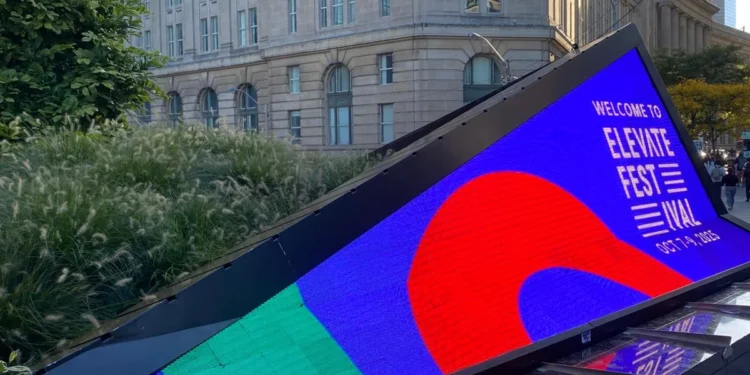Calgary-based Serenity Power, led by Aleisha Reese Cerny, has won the US $100,000 Women+ Pitch Prize at this year’s Elevate Festival 2025 in Toronto. The startup’s solid-oxide fuel-cell technology impressed judges for its potential to make renewable-energy storage cleaner and more efficient.
Earlier this year, Techsoma reported how Elevate Pitch 2025 prepared women founders for the stage through an intensive incubator run by Elevate and The Firehood. That preparation paid off on the main stage, where Serenity Power emerged from a cohort of 30 founders who spent five weeks refining investor decks, learning fundraising strategy, and rehearsing their stories.
The prize, delivered in partnership with The Firehood and supported by Equivesto, signals how Elevate has evolved from a startup showcase into a platform that merges inclusion with national innovation goals. For founders like Cerny, the cheque matters, but the visibility and investor introductions matter more.
How Elevate Built The Stage
Elevate Pitch 2025 unfolded between 7 and 9 October in Toronto, drawing nearly 10,000 attendees across conference sessions, pitch stages, and policy forums. Over five weeks before the event, the Women+ Entrepreneur Incubator trained its participants in investor relations, pitch delivery, and financial planning. The Firehood, a Canadian angel-investment network for women, provided mentors and direct access to its investor community, while Equivesto handled investment-readiness support and due-diligence workshops.
Other finalists included Tydra Labs, a data-driven startup preparing to raise CAD $750,000, and Moon Trades, which placed third in the Black Innovation Zone (BIZ) Showcase. Together, they reflected the range of ideas, from AI to climate tech, that defined this year’s festival.
Across panels and stages, speakers tied those ideas to Canada’s broader innovation narrative: AI policy, digital sovereignty, and inclusive growth. By linking the pitch stage to these national conversations, Elevate positioned itself not just as a competition but as part of Canada’s effort to shape a more equitable tech economy.
What This Means for Canada’s Startup Landscape
The Women+ Pitch has become a mirror of how Canada wants its startup story told, one that ties inclusion to innovation policy rather than treating it as an afterthought. The partnership between Elevate, The Firehood, and Equivesto is a case study in how private capital and public support can intersect to fill a persistent funding gap. Women-led startups still receive less than three percent of venture capital in Canada, a statistic the programme was designed to challenge.
Unlike traditional pitch contests that stop at the stage, Elevate’s model blends capacity building, mentorship, and visibility. Founders are given the tools to manage investor conversations, not just the spotlight that comes with them. That approach helps demystify the investment process and creates more confidence in founders who might otherwise stay outside formal funding circles.
At the policy level, this matters because Canada’s government has spent the past few years promoting inclusive innovation as a core national strategy. Elevate’s visible alignment with those goals gives the initiative weight beyond the festival circuit. The event’s focus on AI, climate technology, and digital sovereignty also reinforces the idea that diversity and technological ambition can grow in tandem, that the country’s innovation economy is strongest when it’s broad-based and representative.
For investors, the Women+ Pitch offers a filtered lens into startups that have already passed through due diligence and training. For founders, it serves as an entry point into investor networks that have historically been closed. Both outcomes point to a deeper shift: visibility is becoming a structural advantage, not just a moment on stage.
The Long Game of Inclusive Innovation
The real success of Elevate Pitch 2025 will be measured long after the applause fades. Winning a prize on stage is one thing. Turning that visibility into sustainable growth is another. For founders like Aleisha Reese Cerny, who now carries both capital and credibility, the next step is execution, converting pitch momentum into partnerships, pilots, and follow-on investment.
What stands out this year is how Elevate framed that next step as part of Canada’s broader inclusive innovation strategy. By pairing access to money with access to networks, the festival offered a small but practical blueprint for addressing structural barriers in tech entrepreneurship. That design could hold lessons for other ecosystems still struggling to close their gender and capital gaps.
For African and Middle Eastern markets, where Techsoma’s readers are watching their own startup scenes mature, Elevate’s model underscores a simple truth: visibility, mentorship, and investor readiness can be as transformative as funding itself. When events move from competition to capability-building, they start functioning as infrastructure.
As Canada continues to position itself as a hub for equitable, high-impact innovation, Elevate’s Women+ Pitch has shown what’s possible when inclusion becomes a design principle rather than a talking point. The challenge now is scale, ensuring that programmes like this don’t remain one-off showcases but evolve into long-term engines for growth.














